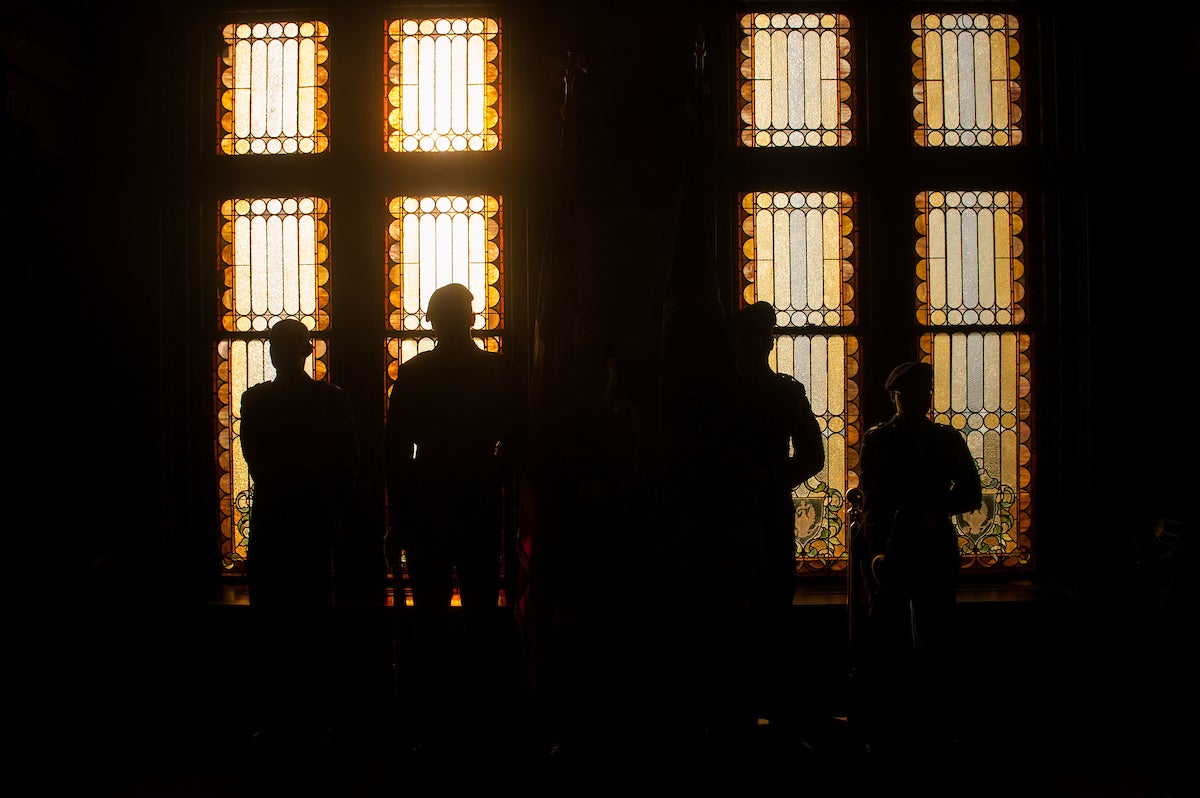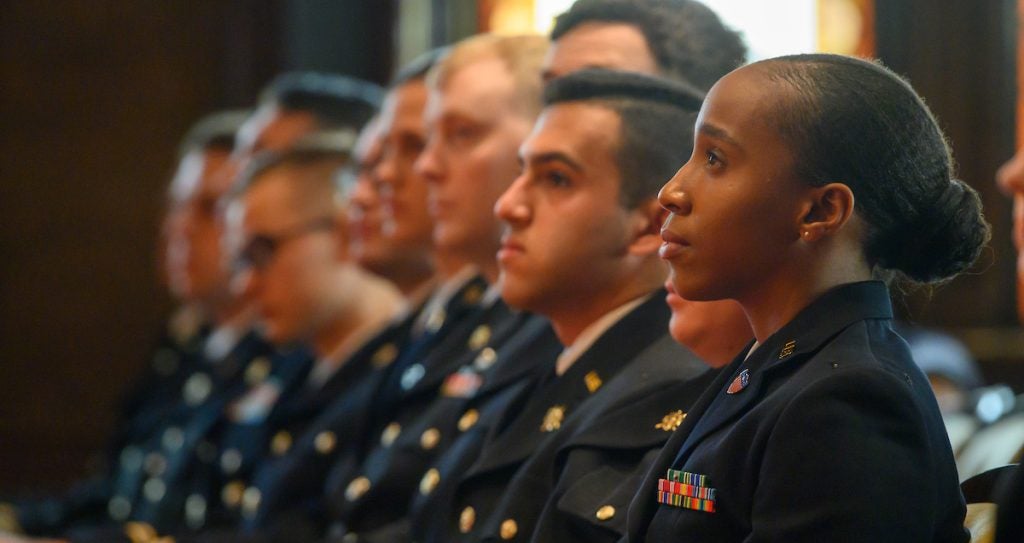My Scars Tell A Story: Major Thomas Schueman (G’19) on His English Degree, New Memoir and Military Service
For seven years, Thomas Schueman (G’19) worked to help his friend, an Afghan interpreter who served alongside him in Afghanistan, secure a U.S. visa and leave the country.
His friend, Zainullah Zaki, had worked with his Marine Corps platoon in 2010 during the height of the war in Afghanistan. In the years since, Zaki received death threats from the Taliban and had to remain hidden. As the U.S. withdrew from the country and the Taliban closed in during August 2021, the race to help Zaki and his family escape grew more dire.
One year later, Schueman and Zaki published a memoir about their bond, their experiences in Afghanistan and how Schueman ultimately helped Zaki and his family escape.
For Schueman, writing the book was cathartic and helped him unpack his experiences during the war — a process, he says, in which he relied upon lessons learned from Georgetown’s master’s in English program.
The Road to Georgetown
Schueman had served as an officer in the Marine Corps for 10 years and deployed for two tours of duty in Afghanistan before coming to Georgetown for his master’s degree in English.
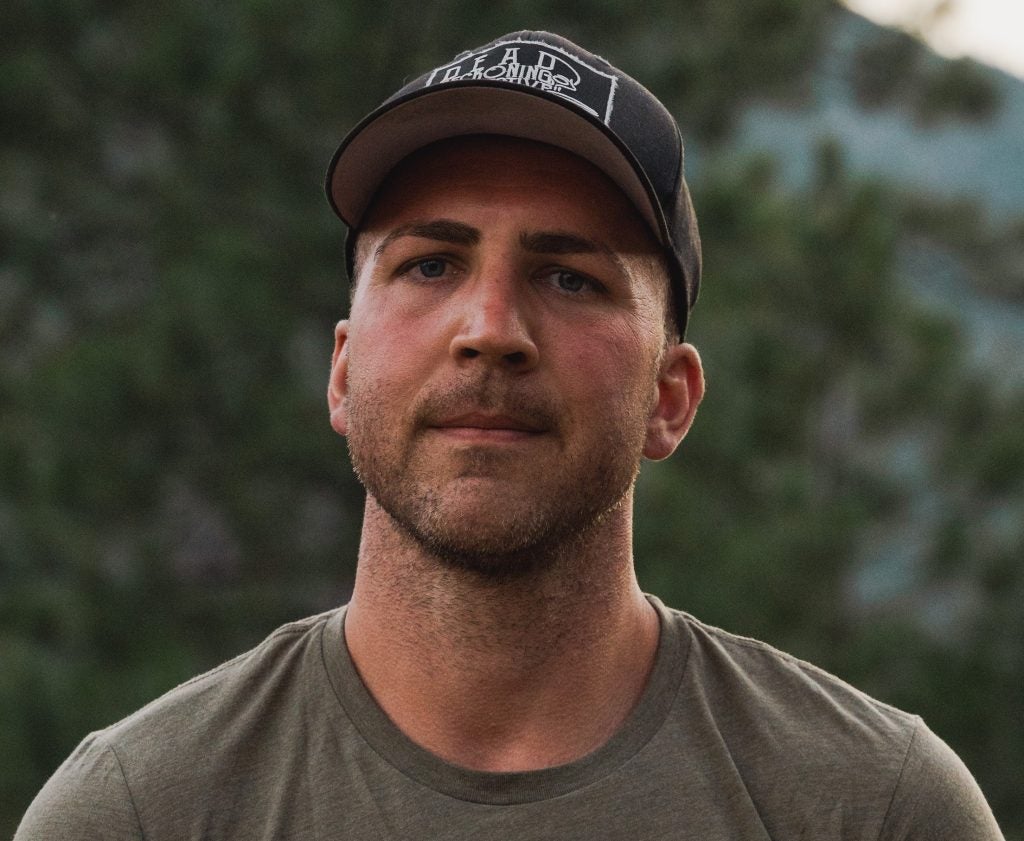
Photo: Courtesy of Thomas Schueman
He had been ready for his next professional step, so when the military put out a call that they needed an English teacher at the Naval Academy in Annapolis, Maryland — and that they would fund the candidate’s master’s degree before coming to teach — he applied for the role.
“I knew I wanted to get outside my comfort zone, but I didn’t know how far outside my comfort zone I would get,” he says.
However, this opportunity came with a steep ask: Schueman had just one year to complete his graduate degree and gain the credentials required to teach at the Naval Academy. After being admitted to several DC-area schools, Schueman was drawn to Georgetown’s Jesuit values, its rigorous academic reputation and the M.A. English program’s curriculum.
Once at Georgetown, he had to adjust to a classroom environment — one that was vastly different from the battlefield. The echo of mortar and machine guns was replaced by Socratic-style lectures and learning instead of leading. Schueman said he learned how “to be humble and curious with a desire to learn from others’ experiences.”
“I learned how to read and write in a much more meaningful way and learned about other peoples’ experiences. Literature gives you a lot of perspective to see and experience things you might otherwise not.”
— Thomas Schueman (G’19)
“The experience as a whole was so significant to my development as a human,” he said. “I learned how to read and write in a much more meaningful way and learned about other peoples’ experiences. Literature gives you a lot of perspective to see and experience things you might otherwise not.”
His Capstone Experience
Schueman began studying literature about veterans and found that they were often depicted as “damaged, broken and unstable.” He felt there was a gap between those who served and the concept of growth. The Greek warrior Achilles represented rage, for example, while Odysseus was too damaged by battle to return to civilian life; in films set during the Vietnam war, like “First Blood” and “Born on the Fourth of July,” the narrative described veterans as people who were calloused and couldn’t come home, he said.
Schueman sought to change the narrative. He found the capstone course at Georgetown gave him the tools and resources he needed to develop a framework and hone the themes around his project. After an open mic night at Dog Tag Bakery, in which he shared his experiences as a veteran and felt deeply connected to the audience, he was inspired to continue sharing his story. For his capstone project, Schueman decided to create an online outreach program on Instagram to “elevate the narratives around veterans in combat, help them build resilience and aid in recovery after war-time service,” he said.
Three years later, his Instagram account has grown to more than 50,000 followers and gave him a platform to talk about veterans in a more holistic way and bring awareness to Zaki’s case as a byproduct, he said.
Schueman also found similarities between his military experiences and Georgetown.
“What I found as a team at Georgetown were my battle buddies, and my cohort shared in the endeavor of late nights working together and keeping each other’s morale up,” he said.
After completing the M.A. English program in an accelerated 12-month period, Schueman said he felt prepared and equipped to teach English.
“The quality of the professors within the Department of English is so incredible and to have the opportunity to study and learn from them was remarkable. The ways that I developed my courses were directly impacted by them, and any one of the courses I took I would highly recommend.”
Professor Kathryn Temple was Schueman’s capstone advisor. She said she was impressed by his commitment, grit and intelligence.
“One of my fondest memories while working with him was the day he came in for a meeting about his project and under a bit of questioning admitted that his first child had been born the night before and he had been up all night! It was an honor to help guide him through his project. I’ve followed his career since with interest and quite a bit of awe.”
— Kathryn Temple, Professor of English
“Despite the pressure exerted by the very short timeline to degree required by the military, he never hinted of the stress he must have been under,” she said. “One of my fondest memories while working with him was the day he came in for a meeting about his project and under a bit of questioning admitted that his first child had been born the night before and he had been up all night! It was an honor to help guide him through his project. I’ve followed his career since with interest and quite a bit of awe.”
Writing a Memoir
Two years after graduating, Schueman began writing in earnest about his own wartime experiences and his years-long relationship with Zaki who was still fighting to obtain a visa.
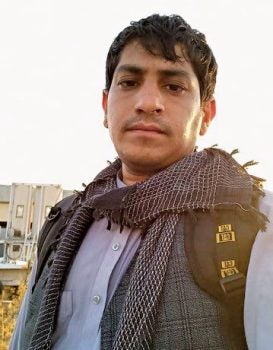
Photo: Courtesy of Zainullah Zaki
“The book is about making meaning, and while I was at Georgetown I had an opportunity to unpack my experiences. I found that writing was the most cathartic way to work through it.”
When they met in 2010, Schueman had had several interpreters quit when bullets fired, but Zaki did not. He spoke the local dialect as well as English and connected with him on a professional level, Schueman says. “He went from being a person who translated for me to a friend and then a brother fighting alongside us.”
From understanding cultural nuances and facilitating interactions with locals to reading both the human and geographical terrain, Zaki and Schueman worked together for seven months. Zaki continued to serve with the U.S. military for another two years, and the threats on his life continued. Schueman noted that “it was well documented that the Taliban would execute anyone they discovered who had worked with U.S. partners.”
Five years after Schueman began helping Zaki apply for the Special Immigration Visa program — an opportunity offered to allies who volunteered to support the war efforts alongside the U.S. and were subsequently being persecuted — his friend’s application still hadn’t been approved. In early 2021, when Schueman asked what would happen to him if U.S. forces left entirely, Zaki said his family would be killed.
Schueman got busy trying to find a way to get his friend out. He used his platform on Instagram, developed from his capstone project at Georgetown, to start a social media campaign in April 2021 to get Zaki and his family out of harm’s way. He met with staff for senators and congressmen and even appeared in a front-page story in the The New York Times highlighting his efforts. Still Zaki’s visa was stalled.
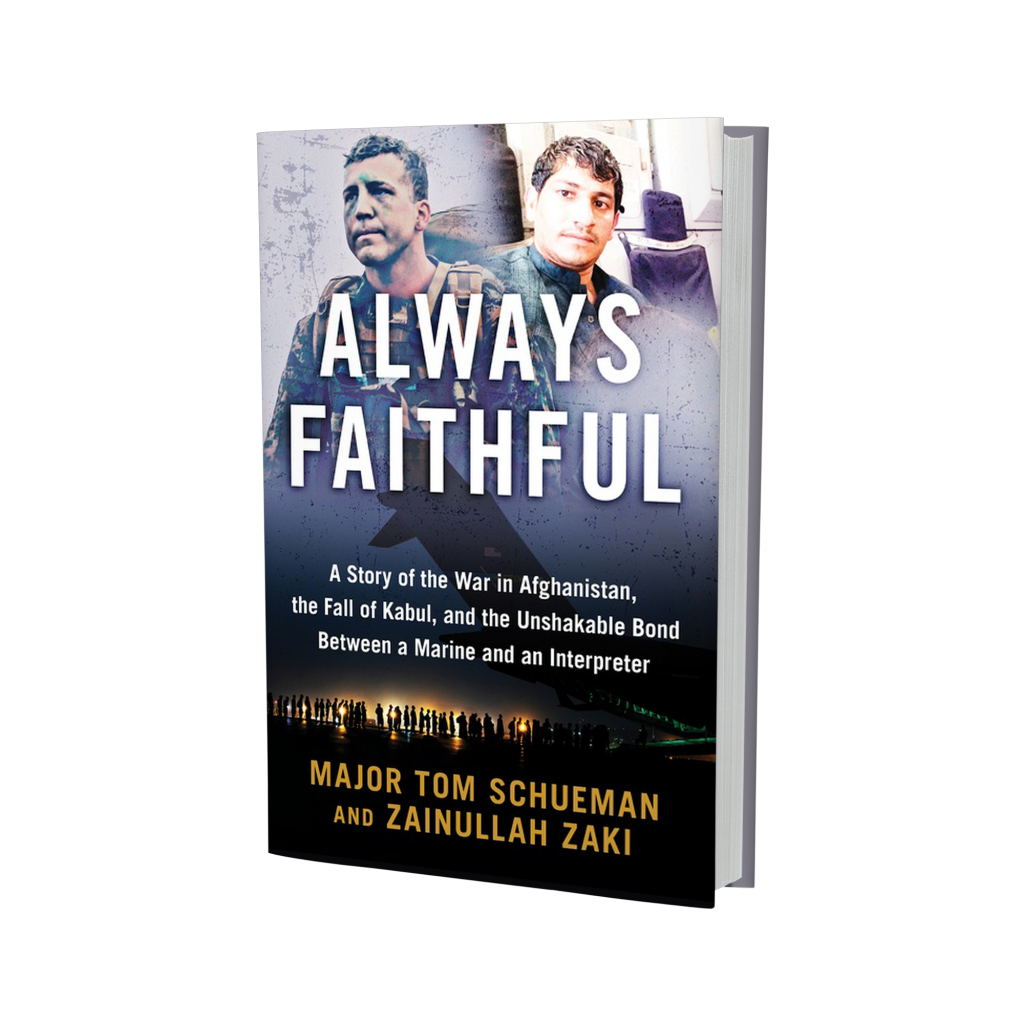
Photo: Courtesy of HarperCollins
Schueman eventually coordinated a rescue operation for Zaki and his family when the U.S. withdrew from Afghanistan in August 2021. On the third try, after an hour and half of silence in his group chat with Zaki, Schueman learned his friend’s rescue was only accomplished by the sheer might and mettle of a military friend who put together a team of soldiers, jumped a wall to push the Taliban back and pulled Zaki and his family to safety.
Shortly afterward, Schueman decided to write a memoir about his experiences and invited Zaki to join him. The book alternates chapters between the two authors — a baton-like handoff Schueman and Zaki felt was important to allow readers to hear both sides of the story.
“I find what Zaki has to say about being 11 years old on September 11th in Afghanistan and how he talks about it in a pastoral and beautiful way – instead of being a war-torn country – was an important perspective to include,” he said.
In the process of writing this memoir, “Always Faithful,” Schueman said that lessons learned from the M.A. English program equipped him with the critical thinking skills to process, analyze and articulate his wartime experiences using best practices gleaned from several writing program professors to frame a sustained argument throughout the entire book. It was published by HarperCollins in August 2022.
Reflection and Remembrance
While Schueman’s memoir honors and reflects upon how his path converged with Zaki’s in Afghanistan and how they developed an unbreakable bond despite the dangers inflicted by the war on terror, he shared that it was also “about making meaning and writing to figure out my own experiences.” Deeply personal with a boots on the ground account, they both ask whether twenty years at war in Afghanistan was truly worth the price.
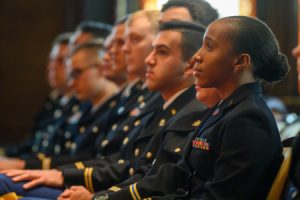
“We veterans are so fortunate to know the deeper worth of serving something selflessly and what a privilege it is to commit yourself to a higher calling. To make the sacrifice and stand amongst men and women who are all committed to one another — whether we did it for four years or forty — is an incredible privilege.”
“To make the sacrifice and stand amongst men and women who are all committed to one another — whether we did it for four years or forty — is an incredible privilege.”
— Thomas Schueman (G’19)
